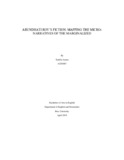Arundhati Roy’s fiction: mapping the micro-narratives of the marginalized
Abstract
Postmodernism starts with shifting of ideas from modernism. In postmodernism, authors
adopt multiple features like historic-metafiction, magic realism, intertextuality and many more.
One of the major changes that happen in postmodernism is, focusing on micro-narrative rather
than meta-narrative. Postmodernists give importance to every small issue in society. Arundhati
Roy, being a postmodern writer, brings light to the shattered stories of people living in our
society. The aim of this thesis is to illustrate the sufferings of marginalized groups, specifically
Transgender, Dalits (untouchables), and women in Indian society by tracing Roy’s two novels,
The God of Small Things and The Ministry of Utmost Happiness. The untold stories of these
people from the fringes of the society, their experiences, and their views on issues that directly
concern them are what Roy capitalizes in her fiction. She gives them voices to portray their
terrible day to day sufferings in her novels The God of Small Things and The Ministry of Utmost
Happiness. Further, this paper includes, biographical mapping of Arundhati Roy to depict how
her real life experiences shape her fiction.
Description
This thesis is submitted in partial fulfillment of the requirements for the degree of Bachelor of Arts in English, 2019.Department
Department of English and Humanities, Brac UniversityType
ThesisCollections
- Thesis, B.A. (English) [652]

